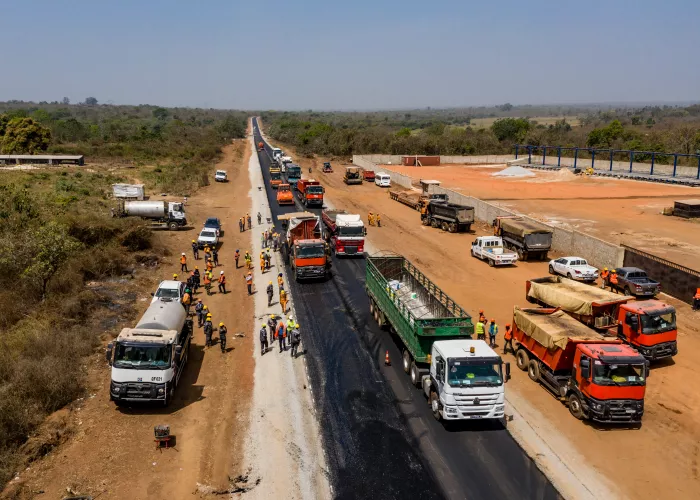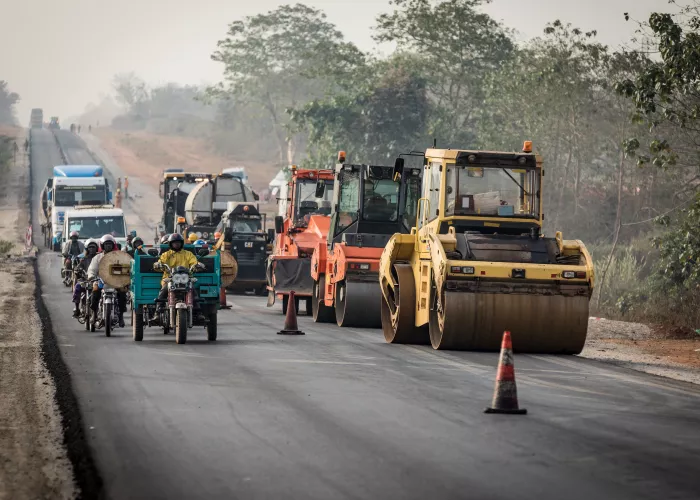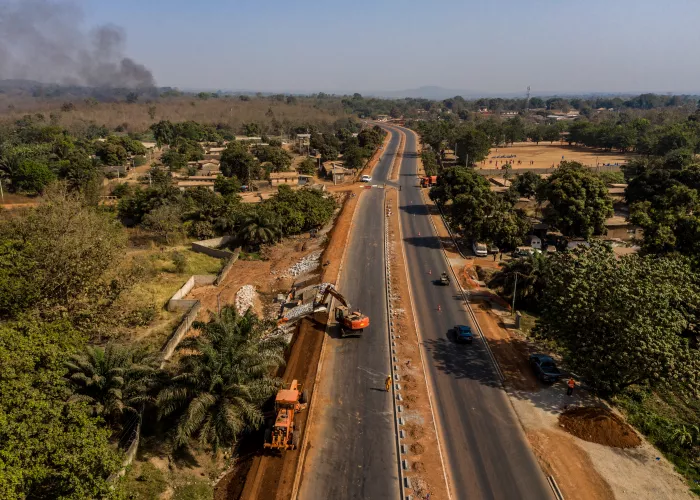
Route du Nord, a lifeline for Côte d’Ivoire
The surface of this heavily traveled road was in an advanced state of disrepair in 2017, having seen some 40 years of service. Due to a lack of upkeep and the fact that many drivers paid no attention to speed limits or other signage, this two-lane road used daily by 300 to 500 trucks was racking up high accident numbers every year. The Côte d’Ivoire authorities thus launched a plan to rehabilitate 220 kilometers of road in 2017, to ensure safety for users and strengthen this strategic infrastructure.
In 2018, the contract for the 125-kilometer section was awarded to a consortium including Colas. The Route du Nord is used to transport goods such as cotton, cashews, mangoes, sugar and bananas, all local products destined to be exported around the world. The road is also used to transport petroleum products from the Port of Abidjan heading north to Mali and Burkina Faso. This rehabilitation project was successfully completed two years later, greatly improving road safety for users.
Quarry and production site created for the project

A 56-hectare quarry and production site was created a few miles from the road to supply materials for the project. About a million metric tons of pebbles were produced for the project. A crushing plant as well as two asphalt plants were also built in the area. In all, 550,000 metric tons of asphalt mix were used to rehabilitate the foundation layer forming the structure of the new road and for the grooved pavement used as the new surfacing. In addition, the consortium set up a maintenance and repair workshop for the 330 site machines used on the project.

More than 600 people were hired for this project. Training sessions on safety and environmental protection were provided on a regular basis to all worksite personnel. Seventy staff members completed a certification course on heavy equipment operation. As traffic flows between Bouaké and Kanawolo were not interrupted at any time during the project, specific measures were put in place to protect worker safety. Many warning signs were installed to alert motorists along the route, supplemented by a motorcyclist employed to manage and slow down traffic within the construction zone.
Improvements in local living conditions

The section of the Route du Nord involved in this project passes through around 20 villages. At several of them, boreholes were drilled and equipped with submersible pumps to supply drinking water. As a rule in this region, access to clean drinking water is inadequate and local people have until now had no other choice than to make their way to the nearest river or use water from reservoirs that is often unsafe. At the conclusion of the project, manual pumps were fitted at the boreholes so that village residents could use them, thereby substantially improving their living conditions. In addition, a school was built at the village of Digbe with three classrooms, an office, and housing for the school principal and teachers.
A TopSite-certified construction site

In December 2019, the Route du Nord project was awarded Bouygues Construction’s TopSite Innovation label. To obtain this distinction, a project must meet specific standards of performance grouped into five categories: health and safety, the environment, workforce-related issues, social issues, and quality and customer satisfaction. Several examples of best practices during the Route du Nord project were highlighted, such as the reuse of sugarcane vinasse, a residue from the production of ethanol at the distillation plant in Bouaké. Used as a fertilizer, it also has the ability to suppress dust for a week, thus avoiding repeated watering during operations at the construction site.